
Meet our Law Students
_(2)_(1).jpg)
Tsara Mirza-Reina, Law with Spanish (LLB)
I can safely say that studying Spanish has contributed hugely to the opportunities I have had in my life. The skills I have learned from studying a language and speaking a language have helped me develop a strong work ethic. Speaking a different language has helped me build deeper connections with people from around the world through being able to bridge the gap in times of need.
.jpg)
Eunice Tolu Olatunji, Mediation & Conflict Resolution (LLM)
The practical skills and confidence I gained at Strathclyde, particularly through the Mediation Clinic, were instrumental in securing this role. During my time at ACAS, I was recognised as one of the high-performing conciliators and had the opportunity to facilitate the participation of an ACAS representative at one of the Mediation Clinic's workshops, a moment that felt like bringing my learning full circle.

Heather Burns, Law, Technology & Innovation (MSc)
At a crucial time for the field and for human rights both online and offline, it was good to take some time to shore up the academic and legal foundations needed for the road ahead. The Strathclyde MSc reflected that perfectly.
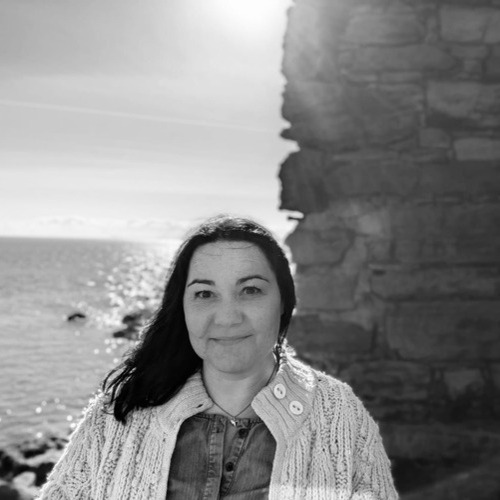
Tracey Wright, Criminal Justice & Penal Change (LLM.MSc)
One of the most enjoyable aspects was meeting and forming strong friendships with international students from Saudi Arabia, Africa, Pakistan, and Germany. The diversity of experiences and perspectives made discussions and debates incredibly enriching.
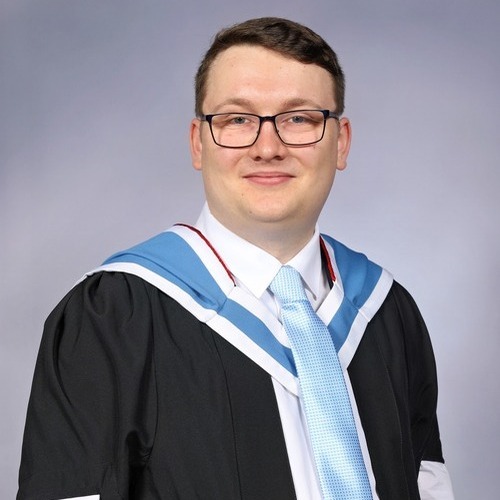
Miles Wright, Criminal Justice & Penal Change (LLM/MSc)
The quality of teaching at Strathclyde was excellent, and staff were always willing to answer questions. Furthermore, opportunities for feedback were integrated into the module, so that we could implement feedback at the next available opportunity.
_(1).jpg)
Aidan Fisher, Human Rights Law (LLM)
With support from the Strathclyde Law School, I was able to attend the Nelson Mandela World Human Rights Moot in Geneva. Seeing so many legal practitioners dedicated to doing good in the world convinced me that I could as well. It gave me an insight into other career paths beyond becoming a solicitor and beyond our domestic jurisdiction. Undertaking a Masters degree became an obvious choice to deepen and enrich my understanding of human rights.

Jan-Carl Janssen, Criminal Justice & Penal Change (LLM/MSc)
Every week was incredibly exciting and varied: in addition to various lectures, we often went on excursions to better understand the practical application of what we had learnt in theory.
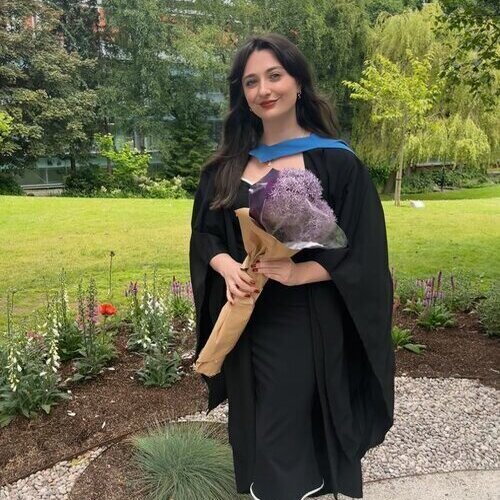
Nicola Martin, Law with French (LLB)
The support at Strathclyde was outstanding. The staff in both the French department and the Law School were incredibly supportive - they understood that academic and personal life can overlap (even if you don’t want it to!), and their guidance was invaluable throughout my time there.
.jpg)
Kelly Daniels, Law & Social Policy (BA)
In first year it's great that you can be flexible with subjects to see what you like and don’t like and it allows you find your ‘thing’.
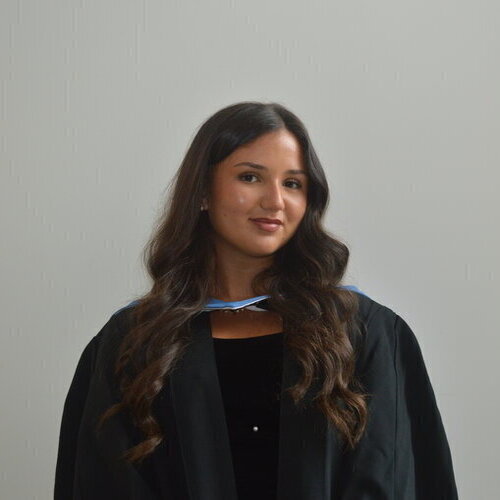
Rhianwen Hopwood, Journalism, Media & Communication and Law (BA)
The BA Hons Journalism, Media & Communication and Law programme at the University of Strathclyde offered the perfect blend of disciplines to help me learn, grow, and develop both as a student and as an individual.

Vittoria Lupi, Law with French (LLB)
The standout highlight of the programme has to be the compulsory year abroad. Not only did I gain valuable cultural experiences working and living in France, but the improvement in my language skills was incredible.

Brian Dan, Human Rights Law (LLM)
Strathclyde’s human rights programme provides an opportunity to develop deep knowledge and skills alongside an approachable team of academics, stellar legal practitioners, and policy experts.

Nathan Shevlin, Law with Spanish (LLB)
This has been the most fulfilling and excellent experience of my life, allowing me to expand on and develop my knowledge and my language skills, as well as to form inter-personal relationships with other people from across the globe. Studying abroad is truly a life-altering experience, in the very best way possible.

Eva Ralston, Law with Spanish (LLB)
Being able to proficiently speak another language is an asset that will allow you to stand out from your peers. A full LLB Law Degree alongside that makes you almost unstoppable!

Hamish Clark, Construction Law (LLM)
I found the course fascinating. It filled in many of the gaps in my understanding of contracts and procurement and the knowledge gained in my career provided a significant platform upon which to develop.
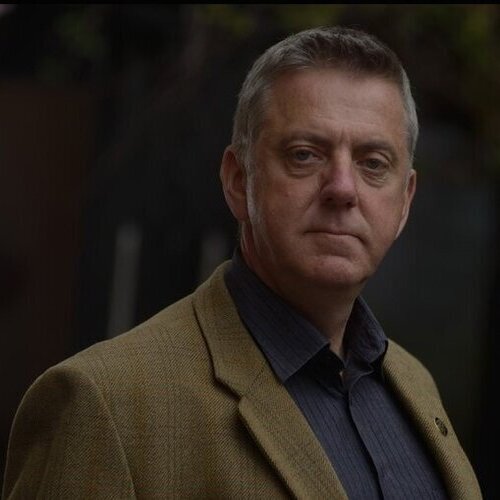
Gordon Gibb, Construction Law (LLM)
My advice is: apply the knowledge and common sense, be flexible, don’t necessarily believe assumed facts, do enough research to ensure that you are right, and finally enjoy the journey, the eminence and the people you meet along the way.

Robyn Conlan, Human Rights Law (LLM)
The main challenge for me was the jump between undergraduate and post-graduate workload. However, I believe if you remain organised from the beginning, the workload is completely manageable. Also, when you are studying an area of law you are interested in, it is half the battle!

Sayali Walavalkar, Human Rights Law (LLM)
I loved when we used to do this exercise, where we used to act as members of some State Government or international NGOs and UN and share a dialogue on an existing issue. That experience was surreal. My favourite part was the International Human Rights Law lectures conducted by Prof. Alan Miller.
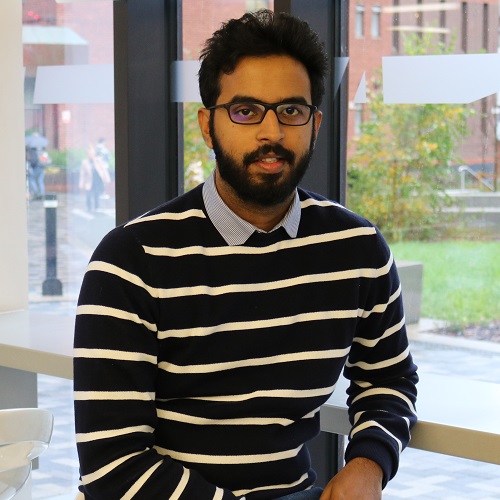
Jonathan Rodrigues, Mediation and Conflict Resolution (LLM)
[The course] is led by a faculty who are open-minded and approachable to the inclusive value that mediation preaches. You are tested to challenge your existing philosophy of mediation, invited to relearn by choice and encouraged to reflect on your practice.
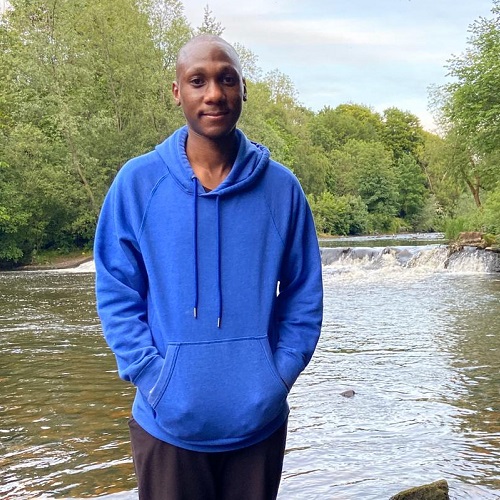
Tinotenda Jakazi, International Commercial Law (LLM)
The course tackles relevant contemporary issues in international commerce and fosters the development of views and ideas within a diverse, global learning context. As a result of studying the course I have added broader international perspectives, as well as global cultural and contextual understanding to my skills as a commercial lawyer.

Mingyi Huang, International Commercial Law (LLM)
The multi-cultural learning environment at Strathclyde is amazing to me. We are encouraged to share ideas based on our background and experiences during seminars, which helps broaden my views.
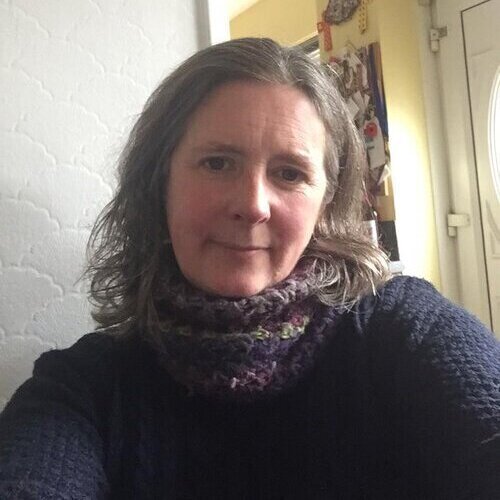
Jo Harknett, Mediation & Conflict Resolution (MSc)
The Strathclyde course sounded comprehensive and exciting and I liked the idea of some practical application as well as theoretical learning. I called the course leader Charlie before putting in my application which not only reassured me that I would be able to manage the workload but furthered my interest in the course.

Gordon McKinlay, Mediation & Conflict Resolution (MSc)
I absolutely loved my time at Strathclyde. Taking the time to think deeply, read widely and engage with others has proved to be extremely valuable.
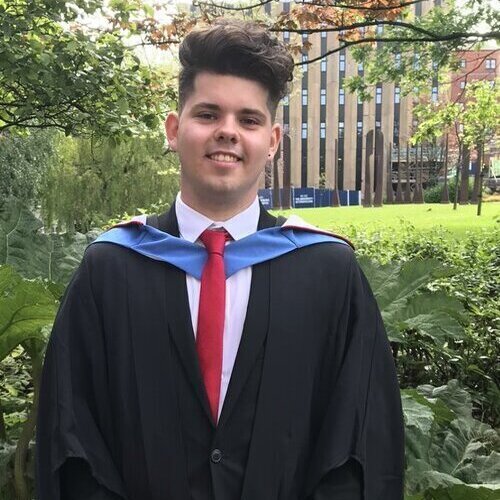
Steven McLaughlin, International Commercial Law (LLM)
If you have an interest in commercial law, I cannot recommend this course enough. It has helped me so much in achieving interviews and a summer vacation scheme with Pinsent Masons.

Nicola Sharman, Global Environmental Law & Governance (LLM)
Having the opportunity to study alongside such a diverse range of people, from different countries, at various stages of their life and with different career ambitions, was amazing. I think we learnt a lot from each other.

Si Zongkun, Law (LLM)
With this course you can choose courses in each area of your interest. Through this you may find your favorite and then be able to take further study in your future career.
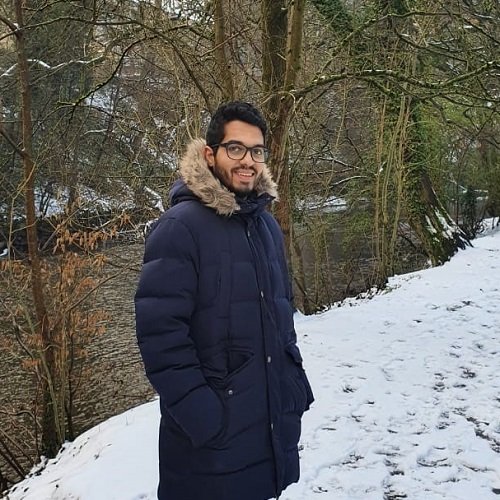
Mouad Bahassan, International Commercial Law (LLM)
When applying to universities in the United Kingdom, several factors helped me choose this university, the first of which is the university ranking, as the University of Strathclyde is one of the most distinguished universities in international commercial law, with many professors specializing in this field.

Marta Solari, Global Environmental Law & Governance (LLM)
First of all, my choice to study at Strathclyde was driven by the presence of the Strathclyde Centre for Environmental Law & Governance (SCELG), a flagship of Strathclyde.

Alexander Hewitt, International Commercial Law (LLM)
The course content was of particular interest, along with the opportunity to complete the course part-time, which suited my workload and enabled me to also continue to focus on my day job.

Tania Nascimento, Criminal Justice & Penal Change (LLM/MSc)
The LLM in Criminal Justice and Penal Change helped me explore my interests further. I was pleasantly surprised that the course covered such a range of topics, including Criminal Justice & Penal Decision-Making, Childhood & Crime, Surveillance, Technology & Control, and Restorative Justice.

Sriram Venkatarao, Construction Law (LLM)
This is primarily due to the benevolent and understanding nature of both academic and support staff at the university. They always try to stay in touch and extend support both academically and beyond, which made the study a whole lot interesting and satisfying personally during these times.

Maria Apostolidou, International Commercial Law (LLM)
I was particularly delighted to attend the modules of E-Commerce and Intellectual Property, because of the enormous skillset I acquired through them; my engagement of writing as a Senior Editor for Commercial law at Ousia Review was inspired by the challenges faced during these constructive lectures.
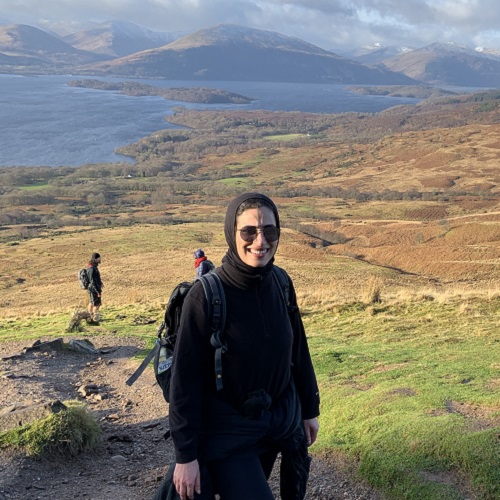
Nour A Kh A A Alfoudari, International Commercial Law (LLM)
I chose to study in Strathclyde because I was fascinated by the beauty of Scotland, and Glasgow was the best option as Glaswegians are well known for their affability and kindness. The LLM International Commercial Law program caught my eye, therefore, I only applied for Strathclyde and fortunately, I got an unconditional offer to join.

Helen Vaupel-Schwittay, Human Rights Law (LLM)
Looking back now, at the opportunities I’ve had and the work experience I’ve gained by networking with my lecturers and being open to opportunities, I would have never imagined myself here when I first started the course a year ago!

Kyle Fawkes, Global Environmental Law and Governance (LLM)
The students in my programme hail from countries across four continents and each brings a unique academic or practical background to the class discussions. Many of the virtual activities have promoted intercultural exchanges and collaboration, which are invaluable opportunities in a programme that has a distinct focus on international relations.
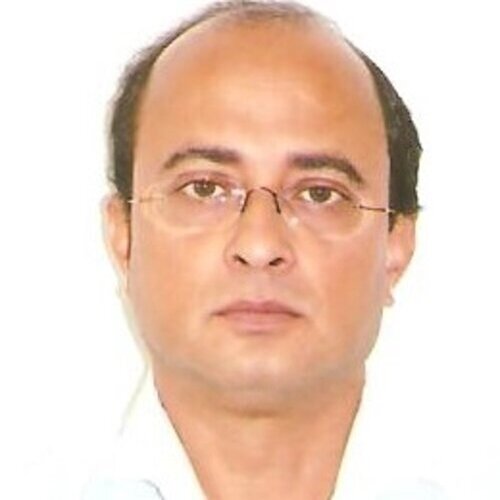
Aninda Mitra, Construction Law (LLM)
For me to get back with academics after 27 years is not so simple, but the staff at Strathclyde are very supportive and helping me along my journey.

Abdulrahman Aljohani, Law (LLM)
The huge knowledge and experience of the lecturers, as well as their method of teaching, is immensely impressive. They have the ability to encourage students to work together and in groups, which refines the students’ skills, such as the ability to discuss and exchange ideas and opinions.

Cecilia Chum, Law (LLB)
The Law School has provided a lot of career advice and work experience opportunities for us. I have an internship at a law firm located close to the city centre campus, I work here during my days off.

Weronika Jaworska, Law (LLB)
What really attracted me to Strathclyde was the Law Schools great reputation. By researching different universities when I was at high school, I quickly learned that Strathclyde is one of Scotland’s leading providers of legal education and offers the biggest student-run Law Clinic.

Aikaterini Rachanioti, Law (LLB)
I had heard good things about the University from friends who studied there before, but I was also impressed by the rankings. One other thing that really tipped the scales for me, was the Strathclyde Law Clinic, which I believe is an incredible way to gain experience in the legal field and be able to practically apply certain aspects of the course.

Mohamad El Daouk, Construction Law (LLM)
The principal trait that I developed on the programme was the ability to grasp and continuously gain new multidisciplinary knowledge in a narrow area of the law. Up to that point law was a very broad subject to me, and even though construction law may seem narrow, it is far deeper than one thinks at the outset. Confidence and communication skills were important skills that materialised in the mock adjudication.

Bryan Yan Wang, Law (PhD)
My supervisors at the law school find my research interesting and they have the expertise to supervise me to help me complete my research. Also, I really enjoy my life in Scotland and I wanted to spend more time at a university in Glasgow.